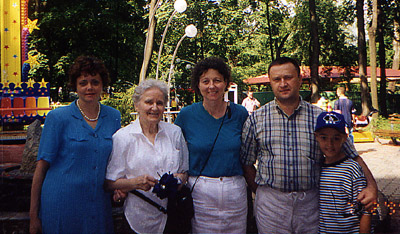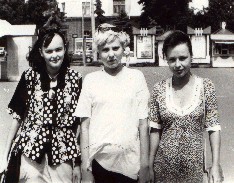|
UDP Highlights
|
 |
In June, Ellen Simpson MD, Volodymyr Skrypka and Andy Skrypka made their 10th journey to Ukraine, working in the Kiyiv region for the third time. As in the past nine years, this medical team spent two weeks teaching children and their parents about diabetes care. The camp allowed the team to deliver insulin and blood testing strips to 64 children. "We've learned so much about helping our children live with diabetes-thanks to the Ukrainian Diabetes Project (UDP)," expressed one grateful mother. "We must learn how to fight for what we believe in. Yes, it is difficult in this country and we have many obstacles, but we can't let them stop us."
The UDP not only teaches children and their parents how to live a healthy life with diabetes, but also supports the need to fight for their rights for better healthcare. Andy Skrypka, Project Director of the UDP, shared the UDP's mission with the camp in a personal light since she herself has lived with diabetes for nearly 30 years. A long time advocate for patients' diabetes needs, she has continually stood up to HMO's here in America. She encouraged Ukrainian parents and children to do the same. Kiyiv's diabetes Camp "Orlenok" is located on the outskirts of Kiyiv. The UDP participated in two out of four sessions.
This year through a special donation from Bayer Corporation, a DCA 2000 meter was brought to the camp. This meter measures blood glucose levels over a 3 month period called HbA1c. The American Diabetes Association recommends all diabetics have their HbA1c measured 2-4 times a year. Of the 75 children tested at camp, most of the children have never had their HbA1c measured. UDP will return next year with a DCA 2000 meter to repeat the HbA1c testing and compare results. If possible more children will be invited to have their blood analyzed. The blood test requires only a drop of blood and the results are provided within 6 minutes.
In Partnership with the Diabetes Charity Fund of Kiyiv|
In 1997 Andy Skrypka, Ukrainian Diabetes Project (UDP) Director, made contact with Natalya Vlasenko, President of the Diabetes Charity Fund of Kiyiv. Impressed with Natalya's organizational skills and ability to get things done, Andy immediately pursued a collaboration between the organizations. June 1999, marked the third year the UDP has provided assistance to the Charity Fund which, among many activities, operates a summer camp "Orlenok" in the Kiyiv region. |
 Diabetes Charity Fund President, Natalya Vlasenko with UDP members: Ellen Simpson MD, Andy Skrypka UDP Project Director, Volodymyr Skrypka and son Fedya. |
The Charity Fund is a non-state, non-commercial charity organization that represents and protects the interests of patients suffering from diabetes. It is made up of diabetic patients and parents of children disabled because of diabetes. Established in 1993, it's guiding principal is to unite diabetics so they have a better chance at survival, can help one another and can create healthy lives. During its existence it has performed a number of activities including coordinating an art exhibit displaying the works of diabetic children; hosting holiday events for children with diabetes; opening an office in the department of endocrinology on diabetes self-management; sponsoring a city event called "Diabetes Day"; and founded the International Diabetes Association of Ukraine.
According to the Charity Fund there are more than 100 million individuals with diabetes. More than 1 million live in Ukraine from which 250,000 require insulin injections daily. During the last 10 years the amount of people developing diabetes increased 10%. Due to this fact, in 1992, diabetes was declared by the World Health Organization (WHO) an epidemic of non-infectious disease. This disease does not choose any country, nationality, skin color or age. Individuals suffer a greater risk to their health as a result of being exposed to ecological disaster zones.
The Charity Fund is always grateful for support and open for cooperation. They can be contacted at P.O. Box 623/8, Kiyiv, Ukraine. The telephone number is (044)483-1793. Natalya Vlasenko is president. Natalya Manzheley is vice-president. Both are mothers of diabetic children.
A Letter From a Diabetic.Hello John,
I hope you forgive me for troubling you. If you remember the summer in a small town of Cherkasy, you'll probably recollect me. My name is Lena. I have diabetes and you helped me alot with the insulin and consultation as I had eye problems. We were three: Oksana, Sveta, and me. But alas! The doctors didn't manage to save Sveta, she died because of the complications.
Oksana has a child. She is a 4 year old girl. And my child is already 3 years old. So your insulin and education have helped me a lot. It's a pity you don't visit our town any longer. But every summer we come to the diabetes camp and hope as for the miracle to see you there. Years pass and we are less and less. And I have already lost 3 of my friends who have diabetes. I take shots 4 times a day and take a short-acting insulin of animal origin. But now I feel much worse than when I used purified human insulin. I constantly have ketones. They give purified human insulin only to children. There is an insulin factory in Kiyiv but it is too expensive for my family. So, we exist.
And of course, I would like to know how is your life and your health.
It is not good at all, I know to ask for it, but still maybe you'll have an opportunity to help me with insulin. So I send you the photo of my son and my friend's daughter.
I hope to see you in my town.
Lena
(John was part of the UDP team in 1994-95)
The hemoglobin A1c test is a laboratory blood test that measures a person's average blood sugar over a two to three month period. It is recommended that the test be taken every three months to help a diabetic assess their current blood sugar control. Keeping tight control of blood sugar is the best way to avoid long-term complications. Hemoglobin is a substance in blood that carries oxygen from the lungs to all parts of the body. A type of hemoglobin called hemoglobin A1c (HbA1c) forms when glucose attaches to hemoglobin. This happens when blood glucose levels are high. There is strong evidence suggesting that the longer the hemoglobin A1c level can be kept low, the longer a person with diabetes can remain free of long-term complications. Reducing HbA1c, even a small amount, is believed to reduce progression of long-term complications. Through a special arrangement with Bayer Corporation, a DCA 2000 meter was brought with the UDP team. All children at camp had their blood level measured. Some diabetic children, not participating at camp, also had their levels measured. Normal value is 4% - 6%. US average is 9.2%. Diabetic children participating at the Kiyiv Camp averaged 10.2%.
Insulin Production in KiyivThere are more than 1 million people in Ukraine who have diabetes. One out of four, according to Minister of Health, Raisa Bogateriova, need insulin injections every day.
Every year Ukraine procures 6-7 million vials of insulin made in foreign countries. Eighty-five percent purchased is of pork origin and fifteen percent is human insulin costing 25-28 million dollars. This unfortunately does not solve the problem.
That is why in Kiyiv, finally, a factory which was built many years ago and produces insulin has started up production and will satisfy the needs of all Ukraine by the end of 1999.
President Kuchma said on the opening of the factory "Endar" that the insulin will be free for the diabetic population. Distribution is expected in November 1999.
As of today, production includes one type of pork insulin. Three new short-acting and long-acting insulins are ready for production. In total they plan to produce 12 different types of insulin and diabetics will have the opportunity to choose which is the best type for them.
For now production does not operate at full capacity, producing only 2-3 million vials per year. But they plan to increase production by the end of 1999.
They plan to produce insulin with a quality that will satisfy not only Ukraine, but also foreign customers as they plan to sell abroad to the republics of the ex-Soviet Union.
(This article was translated from "Arguments and Facts, Ukraine" No 27'99)
While the Ukrainian Diabetes Project (UDP) was active in Kiyiv this summer, other areas of Ukraine continue to receive help in providing diabetes camping experiences to children. In Ternopil, a region in western Ukraine that UDP worked in 1996, Serhiy Nechiporuk continues Camp Zorepad. With the invaluable support of Eric Beamish, from Johnson City, NY, a whopping 110 children attended diabetes camp and received diabetes supplies this year. In Cherkasy, the original site of UDP, a summer camp continued at "Sosnovy Bere" Sanatorium. Kharkiv, the home of the Ukrainian Diabetes Association, operates a year long diabetes long term facility and provides education and supplies to the children. UDP believes there are other camps for children with diabetes throughout Ukraine. However, we are unaware of the education or supplies provided to them.
In Memory of..|
Sveta, pictured in the middle, attended the Ukrainian Diabetes Project's first diabetes clinic in Cherkasy. She was one of our teen participants. Her best friends, Oksana and Lena , pictured next to her, also participated. Both Oksana and Lena went on to have babies, keeping tight control of their blood glucose levels, thanks to the UDP supplies and education. |
 Lena, Sveta and Oksana. |
Sveta passed away this summer from complications of diabetes. She was 25 years old. We will remember her fiery energy and loving heart. She was a best friend that everyone would want. Sadly enough, young diabetics continue to die needlessly. Because of this, the Ukrainian Diabetes Project dedicates its mission to Sveta and other young diabetics who have left us.
Thank you for your contributionThe UDP operates solely from individual contributions like yours. Every summer, our medical team volunteers their time to educate the diabetic children and their families in Ukraine and to provide them with diabetes supplies.
We can only continue our efforts with your help. We would like to take this opportunity to thank everyone for their generous support.
Although we wish we had the space to list all gracious contributors, we would like to take this opportunity to acknowledge the following individuals who have donated $100.00 or more.
Rodman Barber MD, John Batz, Carolyn Bildstein, Wendy Born & Jim Castle, Andrew & Taisa Browar, Elizabeth Burnham, Larry Carbine, John & Mollie Carroll, Bruce & Margaret Coston, John Derkach, Georgia & Emory Elliott, Ambrose & Kay Furey, David & MJ Furey, Audrey Gerber Kircher, Michael Hall, Doris Holder, Peggy Huang, Dorothea Joos, Alexander & Viktor Kolesnikov, Harland & Joann Lee, Warren & Olga Myllenbeck, Broy Riha, Frances Ross, John Sherman, Oleg Steciw, Walter & Mary Strutz, Elaine Whisman, Sharron Willerton
Dollar Drug, Robert Frisby Foundation, Helen M. Harrison Foundation and
Maria Lewytzkyj (1999 REPORT Editor)
Supply Donation
This year's supplies were donated by the following:
Bayer Corporation (Kathryn Landry), Diabetic Youth Foundation, Novo Nordisk (John Kegel), Roche Diagnostics (Chip Rowland)

